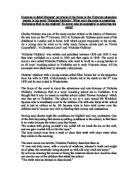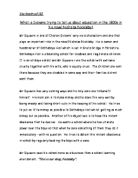With close reference to chapter 13 of “Nicholas Nickleby”, show how Dickens engages the interest and emotions of the reader?
Chapter 13 effectively encourages the reader to resent Squeers and see him as the villain, whereas Nicholas is portrayed as the hero and Smike and the other bays are lavished with sympathetic feelings. The chapter starts with a depressing description of the boys sleeping conditions, Dickens uses words like: feeble, ragged, and dull, to describe it, this powerful description makes the reader feel-strengthening hatred toward Squeers.
Squeers is the headmaster at the boarding school “Dotheboys Hall” where Nicholas was sent to work by his uncle after his father’s death. His father had only a small amount of money so he left it to his brother, and trusted him to look after his family, consisting of Nicholas’s mother and Sister Kate. Nicholas’s uncle is a hard remorseless man and sends Nicholas and his sister to work to earn their keep. The family are moved into a small dirty flat and given little money to live on. During Nicholas’s time at Dotheboys Hall, he meets one of the boys “Smike” and befriends him. Smike has no parents to speak of so he is kept on as a servant to the family. Nearing the end of the chapter Nicholas inspires Smike to run away, unfortunately he is caught, resulting in the chapters climax. Squeers is about to beat Smike but then Nicholas steps in and following a fight, they make off together.
Throughout the chapter Dickens enhances the reader’s negative feelings towards Squeers. Dickens use of verbs to describe Squeers’s actions ads, a greater depth to his character, using words like retorted, bounced and feasted. These words show the rage in Squeers’s character, and the way he goes about daily life, they give the reader a sense of his disrespect to the boys and other characters around him and show how uncouth and disrespectful Squeers is toward the boys and Nicholas. Squeers is a sadist: “With hands trembling with delight, Squeers unloosened the cord” he treats the boys in an appalling manner. He deliberately overworks, underfeeds and poorly houses the boys, Squeers does this deliberately to fulfil his sadistic tendencies, and he also looks forward to beating the boys at every opportunity,: “beat him until the little urchin in his writhings actually rolled out of his hands” this is also indicated in the case of Smike. During the fight between Nicholas and Squeers, It becomes apparent that when Squeers is deprived of fulfilling his ambitions he becomes very enraged: “Sit down, beggar!' screamed Squeers, almost beside himself with rage, and seizing Smike as he spoke.” This confrontation is very important, as it is the climax to the chapter and a large amount of the book so far, it also justifies any doubt the reader has in the roles the characters play, Nicolas as the hero and Squeers as the villain. Dickens used stronger descriptive language and lots of well-written dialog in this section of the chapter: screamed, miserable, daunted and helpless are all examples of this. This stile of writing that Dickens has adopted or created for this piece adds emotion to the moment.







